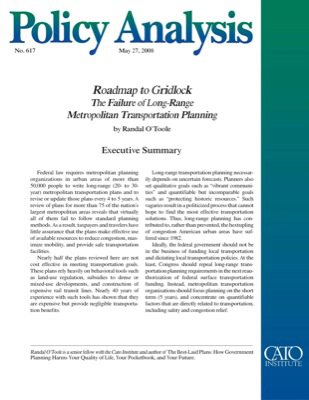No Light Rail in Vancouver!
Long-

Today, the Cato Institute released a new report, Roadmap to Gridlock: The Failure
of Long-
First, only two of the plans reviewed bothered to follow the “Rational Planning Model” that is taught in every planning school. This model calls for the identification of goals, the development of alternative ways of meeting those goals, evaluation of those alternatives, and selection or development of a preferred alternative that best meets the goals.
The other 75 plans used what an “abbreviated planning model” (which could also be called the “Irrational Planning Model”), failing to consider any alternatives and often not even evaluating the effects of the proposed plan.
Second plans fell into two major categories: plans that relied on technical solutions
to transportation problems (signal coordination, new roadway capacity) and plans
that relied on behavioral solutions (land-
The failure to use the Rational Planning Model provides people with no assurance that the plans are cost effective. Reliance on behavioral solutions practically guarantees that plans are not cost effective. It is possible that some planners avoided using the Rational Planning Model in order to disguise the fact that their plans are not cost effective, but it is more likely that they simply did the least that the US DOT requires them to do.
Interestingly, Salt Lake City was one of the two regions that did use the Rational Planning Model (the other being Jacksonville), mainly in response to a state law. Yet Salt Lake City’s MPO deliberately picked an alternative that the plan revealed was not cost effective. Or, to be more precise, a state auditor discovered that the planners had cooked the books to make it appear that the plan was cost effective, and when this was revealed, the MPO said it was picking that plan anyway.
Based on this, the report recommends that Congress drop all long-
The report also recommends that Congress not simply include performance standards in the law, but that it tie federal funding to those standards. For example, transit funding should be in the form of block grants that depend on a region’s actual transit ridership (or, to ease measurement problems, total transit fares). Finally, the report recommends that Congress urge states and metropolitan areas to rely more on user fees for transportation funding and less on property, sales, or other general taxes.
15
Trackback • Posted in Regional planning, Transportation
Reprinted from The Antiplanner
